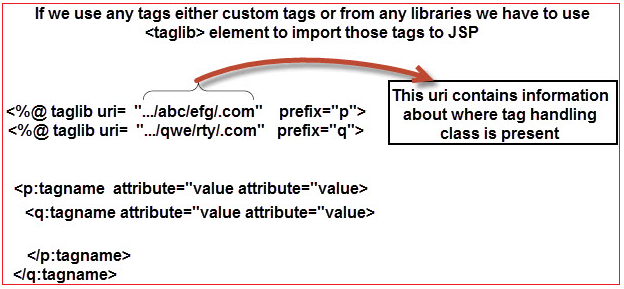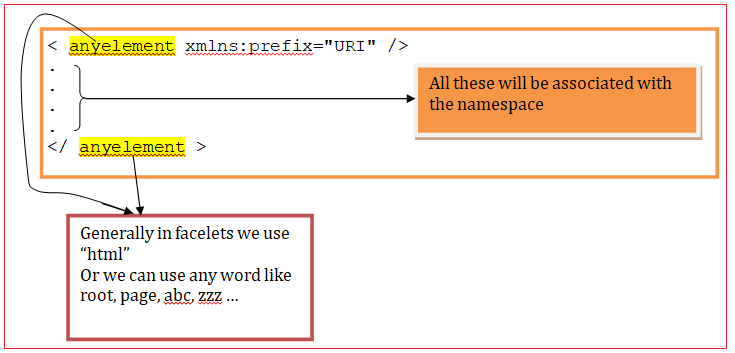| ☰ See All Chapters |
JSF Facelets
All facelets are saved with xhtml extension, example: “home.xhtml”.
Prior to JSF 2.0, JSP was used as a View Declaration Language for JSF.
From JSF 2.0. facelets are incorporated into the core JSF specification.
Facelets cannot be rendered directly as a response.
All facelets will be (should be) processed by javax.faces.webapp.FacesServlet
JSF provides 43 tags in two standard JSF tag libraries:
JSF Core Tags Library(18 tags)and
JSF Html Tags Library(25 tags)
Also JSF provides 11 tags for templating.
When we use JSP as a View Declaration Language for JSF, we should to import the tags using <taglib> and syntax is given below.

Likewise when we use facelets as a View Declaration Language for JSF, we should import the tags using the syntax below.
<anyelement xmlns:prefix="URI" />
This is known as namespace declaration.
We can import more than one library in single tag as
<anyelement xmlns:prefix="URI" xmlns:prefix="URI" xmlns:prefix="URI" />

We can choose any name we want for the prefixes. The convention is f, h and ui for the core, HTML and templating libraries, respectively.
Namespaces for JSF libraries are
JSF Core Tags Library: <html xmlns:f="https://xmlns.jcp.org/jsf/core" />
JSF Html Tags Library: <html xmlns:h="https://xmlns.jcp.org/jsf/html" />
JSF templating Tags Library: <html xmlns:ui="https://java.sun.com/jsf/facelets" />
We can use tags from the libraries provided by third party vendors like Primefaces , RichFaces… for these tags we have to use namespaces as below:
<html xmlns:p="https://primefaces.org/ui" >
<html xmlns:rich="https://richfaces.org/rich">
All the above namespaces can be written in one single tag as
<html xmlns:ui="https://java.sun.com/jsf/facelets
xmlns:h="https://xmlns.jcp.org/jsf/html"
xmlns:f="https://xmlns.jcp.org/jsf/core"
xmlns:rich="https://richfaces.org/rich
xmlns:p="https://primefaces.org/ui" >
We can also use all non JSF html tags (not from JSF library) in facelets
<!DOCTYPE html PUBLIC "-//W3C//DTD XHTML 1.0 Transitional//EN" "https://www.w3.org/TR/xhtml1/DTD/xhtml1-transitional.dtd">
<html xmlns="https://www.w3.org/1999/xhtml" xmlns:ui="https://java.sun.com/jsf/facelets" xmlns:h="https://java.sun.com/jsf/html" xmlns:f="https://java.sun.com/jsf/core"> <head> <title>home page</title> </head>
<h:body style="background-color:yellow"> <h:form> <table border="1"> <tr> <td><h:outputText value="Enter Your Name" /></td> <td><h:inputText id="username" value="#{loginBean.strUserName}" /></td> </tr>
<tr> <td><h:outputText value="Enter Your Password" /></td> <td><h:inputSecret id="password" value="#{loginBean.strPassword}" /></td> </tr>
<tr> <td colspan="2"><h:commandButton value="Login" action="#{loginBean.checkUser}" /></td> </tr> </table>
</h:form>
</h:body> </html> |

All Chapters

